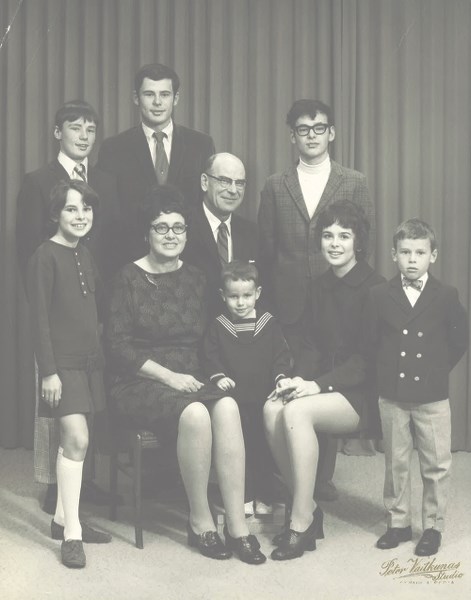Cecile Bielech still remembers when her brother went to war.
Bielech was still in school at the time, and her elder brother, Maurice Mailloux, was very involved in the family business, the St. Paul Foundry, which was busy at the time filling out contracts for supplies as the Second World War raged on.
“When the time came that he had to go, they gave him the option of going to officers’ camp in Ontario, and this is what he did,” she recalled.
He was later deployed to Britain, and then stationed in Holland.
“We received mall from him regularly. That was quite the thing when we got a letter from Maurice. He couldn’t describe where he was or what he was doing, because it was classified.” Those letters form a “very good history, not revealing war operations - the camps he was in, what they were doing, the girls he met,” she says, adding the last with a chuckle.
While they couldn’t hear details of the war efforts from Mailloux, their father read the Edmonton dailies regularly to keep track of war development, and the family would listen to radio updates as well.
“It had been going badly for some time at the beginning, especially. Boats were being sunk left and right, planes were being shot down. They were reporting how many deaths there were – it was very, very stressful for my parents,” recalled Bielech.
Several men and women from St. Paul were part of the war effort, and losses of the war hit home for the Mailloux family. The family’s neighbor had three children who were all impacted by the war – one son was killed, another son lost a leg, and the daughter lost her husband.
“It wasn’t just stories – it was our neighbours,” Bielech recalled, adding that “because Germany had been so big and fearsome, we wondered if they won the war, how it would affect Canada. It was unimaginable . . . it’s like the devil was let loose.”
Then, it seemed to Bielech, there was suddenly a big shift, where the hope came that the Allies might yet prevail. Later yet came the realization that Germany would lose, it was just a matter of when. The Canadians would be given the task of liberating Holland, allowing food and relief to reach millions of desperate people, and engendering a long-time appreciation from the Dutch people to Canada.
For her brother, the feeling of appreciation was mutual, said Bielech, adding, “He loved the Dutch people.”
She still remembers the sweet feeling of relief that flooded the community of St. Paul when the war was declared over.
Many gathered at St. Laurent park for a huge bonfire.
“We were around all night; we were singing. It was one of the nicest, happiest moments in many years,” she said, adding that people were thrilled they would be welcoming their family, friends and neighbours home – although for Mailloux, the journey home took longer.
“When the war was over, and everyone came home, Dad didn’t,” said his daughter, Yollande Mailloux-Hall. She explained that given that her father had trained to be a priest, he spoke English, French and Latin, and ended up being tasked as a translator for the Nuremburg Trials. She said her grandparents had to petition to bring him home, which finally saw Mailloux reunited with his family.
“We felt such relief and happiness that we were all together again,” recalled Bielech, of the reunion between the family and Mailloux’s siblings.
Mailloux picked up back into civilian life in St. Paul, asking upon his return to St. Paul, “Is that O’Neill girl still around?” He and Tillie O’Neill would eventually marry and have children together.
To his family, however, Mailloux didn’t talk much about his war-time experience.
Mailloux-Hall recalled she once tried to find out how he had survived, when others had died in the war, and asked how he managed to come home.
“He just said, ‘I learned to duck.’ He never liked to talk about it,” she said. Mailloux-Hall would end up coming to her own conclusions on how he survived, saying, “Dad was such a deep person of faith. His faith carried him, I believe.”
While he didn’t discuss the war, Mailloux passed on the importance of remembering the sacrifices of soldiers, with the family always attending Remembrance Day services together. Mailloux served as the parade marshall in St. Paul for many years, and employed his booming, voice of rich timbre to call out instructions, which Mailloux-Hall recalled with pride.
Although her father passed away in his late 60s as a result of cancer, Mailloux-Hall says no matter where she is, she never misses a Remembrance Day ceremony, and the family never fails to lay down a wreath in remembrance of their father.
“So many of the people he knew lay down their lives. Dad lay down his life too, he was just able to pick it back up,” she said. For her, this is why it is essential to take a moment to pause, reflect and honour those who have served their country, and those who still do.
“To not honour that, it would just make us such a cold society.”



